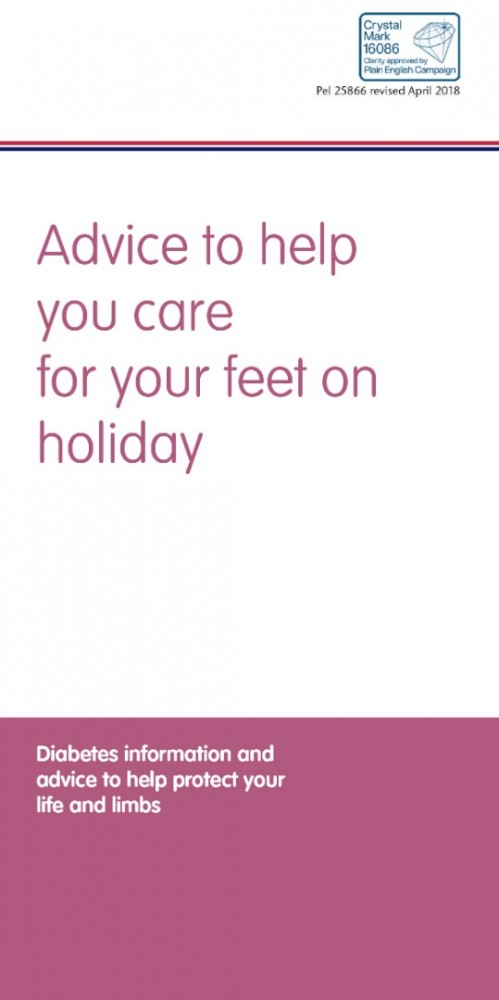|
Accessibility advice:
|
Why should I be worried about my feet while on holiday?
You have been given this advice leaflet because you are going on or thinking of going on holiday. Due to your diabetes, your feet are at risk of developing problems. This risk can sometimes increase while you are on holiday.When you are on holiday your routine and environment change and you may be more active than usual, which can put your feet at increased risk of developing problems which can become serious.
If you discover a small blister or a cut, graze or any break in the skin of your feet, cover them with a sterile dressing. Do not burst blisters.
This leaflet contains advice to help you care for your feet yourself while enjoying your holiday.
What can I do to reduce my risk of developing foot problems?
On the journeyLong journeys can make your feet swell. Try to walk about every half hour if possible; even a short distance will help. This will keep swelling down. Remember your feet may swell in the heat, so make sure your shoes are not too tight.
Check your feet every day
You should check your feet at least once a day for any blisters, breaks in the skin, pain or any signs of infection such as swelling, heat or redness, just as you would at home.
Skin care for your feet
You should wash your feet regularly in warm water and with a mild soap. Rinse them thoroughly and dry them carefully, especially between the toes. Do not soak your feet as this can damage your skin.
If your skin is dry, apply a moisturising cream, avoiding the areas between your toes. You may need to apply extra moisturising cream if your skin gets very dry in hot or cold weather.
Toenail care
Carry on cutting your toenails as your podiatrist has advised you to.
Avoid walking barefoot
Always wear footwear, even on the beach. The sand can become very warm and you may burn your feet without realising it. If you go into the sea, wear some sort of footwear such as plastic shoes to protect your feet. Avoid wearing ‘flip-flop’ type footwear as this may cause blisters between your toes.
Prescription shoes
If you have been supplied with prescribed shoes, do not wear any other shoes during your holiday (except when you are in the sea).
Minor cuts and blisters
Make a small first-aid kit containing sterile gauze dressings and micropore tape. If you get a small blister, cut or graze, use diluted antiseptic on a gauze swab to clean the wound and tape on a dry sterile gauze dressing. Do not use cotton wool.
Medications and prescriptions
Make sure that you pack any antibiotic prescriptions, dressings, insoles and footwear that have been prescribed and issued to you.
If you smoke, you are strongly advised to stop. Smoking affects your circulation and can increase the risk of amputation.
Avoid high or low temperaturesProtect your feet from sunburn with a high-factor sun-protection cream (factor 30 or above) or keep them covered. Do not use dark-coloured materials to protect your feet as they absorb heat and you could burn your feet.
If you have any concerns or discovef any problems with your feet, contact the podiatry clinic or GP for advice immediately.
What should I do if I have a concern or a problem with my feet?
| It is important that you check your feet regularly, especially when on holiday, as you may be more active than usual. If you develop any of the following problems, it is important that you get medical advice immediately, as any delay can have serious life- and limb- threatening consquences.
|
Happy feet will help you to enjoy your holiday.
 Download our leaflet on Advice to help you care for your feet on holiday
Download our leaflet on Advice to help you care for your feet on holiday
Note:
This series of information leaflets for people with diabetes was developed, approved and ratified by the following organisations:
Association of British Clinical Diabetologists, British Association of Prosthetists and Orthotists, The College of Podiatry, Diabetes UK, Diabetes Inpatient Specialist Nurses UK Group, Foot In Diabetes UK, Diabetes Foot Network Wales, Primary Care Diabetes Society, Royal College of Nursing and Scottish Diabetes Foot Action Group.
